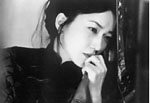CRITICAL DARLINGS often should carry a warning: Not accessible to the rest of us. The movies that reap festival awards are frequently dull, slow, and underplotted. So how to explain—or justify—the reputation of Taiwan’s Hou Hsiao-hsien? He was just elected “Director of the Decade” in the Village Voice film critics’ poll—my untutored vote went to Zhang Yimou—which could stigmatize him further. The same tabulation placed Flowers of Shanghai ninth on the aggregate 1999 top-10 list and first on the ballot of almost every Voice staff critic.
FLOWERS OF SHANGHAI
directed by Hou Hsiao-hsien
runs January 21-February 10 at Grand Illusion
So what gives? Are a few dozen pretentious Lower Manhattan cineastes leading us astray? It’d be simpler to say “yes,” but the more complicated, qualified “no” confirms Hou as a great artist whose canvasses can’t be easily reconciled with the box office. He’s part of Chinese cinema’s new wave, but stands apart from the mainland’s solemn Zhang or Hong Kong’s cosmopolitan Wong Kar-wai. He’s been making movies since the early ’80s and began winning acclaim abroad while pigeonholed as an art house director at home. His New York City retrospective last fall probably skewed the results of Voice voters, who rarely see his films outside of festivals.
Yet while not ready for the multiplex, Hou offers breathtaking rewards for those who recognize that beauty is always worth the wait. Expect no car chases or music-swelling hugs of resolution. Hollywood clich鳠have no more place in Hou’s work than the chopsocky formulas of Hong Kong action flicks. Instead, his pictures are studies of mood and pent-up emotion, where plot-driven action and conventional character development scarcely exist. Launching the Grand Illusion’s seven-film, five-week retrospective, the magnificent Flowers is, appropriately, both an introduction and an exception to the cinema of Hou Hsiao-hsien.
SHANGHAI’S BROTHELS are euphemistically called “flower houses” and its sex workers “flower girls” in Hou’s treatment of a novel set in late imperial China, circa 1884. The city’s dissolute rich idle away their hours smoking opium with foot-bound beauties contractually owned by madams (or “aunties”). Hou presents three overlapping stories in Flowers, with characters and themes introduced in the film’s remarkable first continuous eight-minute shot. His slowly drifting camera records a festive banquet where men play loud drinking games and their courtesans dutifully replenish their teacups as laughter and gossip fill the air.
Golden lamps stand at the center of this and every subsequent scene—all of which end in a fade-out. Your eye can—and should—wander to the background of such gorgeous, carefully composed frames, as Hou often places integral actors and information here (unobtrusively and without dialogue). Quiet Wang (Tony Leung of Chungking Express) has fallen in love with diffident, moody Crimson (Michiko Hada), yet divides his attentions with the ambitious Jasmine. Around them, other flower girls quarrel and scheme, their varying fortunes as unpredictable as the men’s wagering. “No gentleman limits himself to one flower girl,” we’re told—creating constant jealousy and competition among escorts who recognize their “fleeting period of fame” and earnings potential.
In the silences between the parties, however, clients and flower girls struggle with the roles constructed for them. Flowers is Hou’s only real period film, but its rule-bound society echoes through his modern Taiwanese pictures. Yet here the possibility of love—however ritualized—offers the hope of escape. (Outside the casbah-like flower houses, marriage is arranged and love an afterthought.)
Throughout these episodes, Hou uses light and shadow to underscore the dark void of incomprehension between men and women. “I can’t tell what she’s thinking,” Wang despairs of Crimson; later he stoops to spying on her, his eye following the alluring glow beneath a closed door. Elsewhere, Hou surrounds his characters with filigree shadows cast by railings, frames them deep within black foregrounds, and reports their important off-camera actions after the fact. The effect is to deny our desire for obvious narrative information, as the lovers’ own lambent longing is eternally arrested within the beauty of each story and scene.








